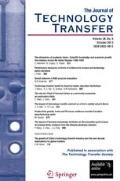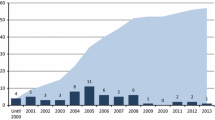Abstract
The assumption that research findings provide the basis for spin-off projects at universities has been found up to now in literature and the practice. Supported by the theory of knowledge, the empirical study presented here shows that this idea is too limited. Only 45 % of spin-offs use codified research findings from the university, while 55 % use tacit knowledge that was acquired at the university. These spin-offs use knowledge beyond research findings, starting companies in the shadow of publications by academic institutions and drawing from the realm of tacit knowledge at universities. Tacit start-up knowledge is present in all scientific disciplines of universities; even the exploitation- and patent-oriented engineering sciences account for almost half of the start-ups. Start-ups based on tacit knowledge lead to both technology-oriented and service companies. They also do not differ from codified knowledge-based start-ups in the number of jobs that they create. The discovery of the tacit knowledge spin-offs as a phenomenon has an entire series of implications for the practice and research. The tacit start-up potential was not considered previously in the university promotion instruments and start-up consultancies. Furthermore, we can assume that tacit knowledge-based start-ups are only an initial indication of the innovation potential within the tacit realm of knowledge for universities and research institutes.
Similar content being viewed by others
References
Agrawal, A. (2001). University-to-industry knowledge transfer: Literature review and unanswered questions. International Journal of Management Reviews, 3(4), 285–302.
Agrawal, A. (2006). Engaging the inventor: Exploring licensing strategies for university inventions and the role of latent knowledge. Strategic Management Review, 27, 63–79.
Ambrosini, V., & Bowman, C. (2001). Tacit knowledge: Some suggestions for operationalization. Journal of Management Studies, 38(6), 811–829.
Audretsch, D. B., & Stephan, P. E. (1996). The case of biotechnology. The American Economic Review, 86(3), 641–652.
Barley, S. R., & Bechky, B. A. (1994). In the backrooms of science: The work of technicians in science labs. Work and Occupations, 21(1), 85–126.
Djokovic, D., & Souitaris, V. (2008). Spinouts from academic institutions: A literature review with suggestions for further research. The Journal of Technology Transfer, 33, 225–247.
Druilhe, C. L., & Garnsey, E. (2004). Do academic spin-outs differ and does it matter? Journal of Technology Transfer, 29, 269–285.
Gorman, M. E. (2002). Types of Knowledge and Their Roles in Technology Transfer. Journal of Technology Transfer, 27, 219–231.
Güldenberg, S., & Helting, H. (2004). Wissensmanagement falsch verstanden? Eine Fortsetzung des Dialoges zur Neuorientierung des Wissensmanagement. Die Betriebswirtschaft, DBW, 64(5), 523–537.
Howells, J. (1996). Tacit knowledge, innovation and technology transfer. Technology Analysis & Strategic Management, 8(2), 91–103.
Josten, M., van Elkan, M., Laux, J., & Thomm, M. (2008). Gründungspotenziale bei Studierenden. Zentrale Ergebnisse der Studierendenbefragung an 37 deutschen Hochschulen. Bonn/Berlin: Bundesministerium für Bildung und Forschung (Hrsg.).
Leonard, N., & Insch, G. S. (2005). Tacit knowledge in academia: A proposed model and measurement scale. The Journal of Psychology: Interdisciplinary and Applied, 136(6), 465–512.
Lowe, R. A. (2006). Who develops a university invention? The impact of tacit knowledge and licensing policies. Journal of Technology Transfer, 31, 415–429.
Nelson, R., & Winter, S. (1982). An evolutionary theory of economic change. Cambridge, MA: Harvard University Press.
Nonaka, I., & Takeuchi, H. (1997). Die Organisation des Wissens: Wie japanische Unternehmen eine brachliegende Ressource nutzbar machen. Frankfurt am Main: Campus.
Pearson, A., Brockhoff, K., & von Boehmer, A. (1993). Decision parameters in global R&D management. R&D Management, 23(3), 249–263.
Pisano, G. P., Shan, W., & Teece, D. J. (1988). Joint ventures and collaboration in the biotechnology industry. In D. C. Mowery (Ed.), International collaborative ventures in U.S. manufacturing (pp. 183–222). Cambridge, MA: Ballinger Publishers.
Polanyi, M. (1966). The tacit dimension. Garden City, NY: Doubleday & Company, Inc.
Polanyi, M. (1985). Implizites Wissen (orig.: The Tacit Dimension, Garden City/N.Y. 1966). Frankfurt am Main: Suhrkamp.
Rothaermel, F. T., Agung, S. D., & Jiang, L. (2007). University entrepreneurship: A taxonomy of the literature. Industrial and Corporate Change, 16(4), 691–791.
Spielkamp, A., Egeln, J., Gottschalk, S., & Rammer, C. (2004). Spin-offs in Germany: Conceptual considerations and empirical evidence. In M. Dowling, J. Scmude, & D. Knyphausen-Aufsess (Eds.), Advances iin Interdisziplinary European Entrepreneurship Research (vol. 3) (pp. 153–181). Germany: LIT Verlag Münster.
Sternberg, R. J. (1994). Tacit knowledge and job success. In N. Anderson & P. Herriot (Eds.), Assessment and selection in organisation: Methods and practice for recruitment and appraisal (pp. 27–39). London: JohnWiley.
Sternberg, R. J., Forsythe, G. B., Hedlund, J., Horvath, J. A., Wagner, R. K., Williams, W. M., et al. (2000). Practical intelligence in everyday life. New York: Cambridge University Press.
Sternberg, R. J., Wagner, R. K., Williams, W. M., & Horvath, J. A. (1995). Testing common sense. American Psychologist, 50, 912–927.
Wagner, R. K. (1987). Tacit knowledge in everyday intelligence behavior. Journal of Personality and Social Psychology, 52, 1236–1247.
Wellek, S. (2010). Testing statistical hypotheses of equivalence and noninferiority. London: Chapman & Hall.
Zucker, L. G., & Darby, M. R. (2001). Capturing technological opportunity via Japan’s star scientists: Evidence from Japanese firms’ biotech patents and products. Journal of Technology Transfer, 26, 37–58.
Zucker, L. G., Darby, M. R., Armstrong, J. (1994). Intellectual capital and the firm: The technology of geographically localized knowledge spillovers. National Bureau of Economic Research Working Paper No. 4946.
Zucker, L. G., Darby, M. R., & Armstrong, J. (1998a). Geographically localized knowledge: Spillovers or markets? Economic Inquiry, 36(1), 65–86.
Zucker, L. G., Darby, M. R., & Armstrong, J. (2002). Commercializing knowledge: University science, knowledge capture, and firm performance in biotechnology. Management Science, 48(1), 138–153.
Zucker, L. G., Darby, M. R., & Brewer, M. B. (1998b). Intellectual human capital and the birth of U.S. biotechnology enterprises. American Economic Review, 88(1), 290–306.
Author information
Authors and Affiliations
Corresponding author
Rights and permissions
About this article
Cite this article
Karnani, F. The university’s unknown knowledge: tacit knowledge, technology transfer and university spin-offs findings from an empirical study based on the theory of knowledge. J Technol Transf 38, 235–250 (2013). https://doi.org/10.1007/s10961-012-9251-1
Published:
Issue Date:
DOI: https://doi.org/10.1007/s10961-012-9251-1




